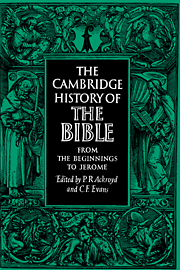Book contents
- Frontmatter
- I LANGUAGE AND SCRIPT
- II BOOKS IN THE ANCIENT WORLD
- III THE OLD TESTAMENT
- IV THE NEW TESTAMENT
- V THE BIBLE IN THE EARLY CHURCH
- 13 BIBLICAL EXEGESIS IN THE EARLY CHURCH
- 14 ORIGEN AS BIBLICAL SCHOLAR
- 15 THEODORE OF MOPSUESTIA AS REPRESENTATIVE OF THE ANTIOCHENE SCHOOL
- 16 JEROME AS BIBLICAL SCHOLAR
- 17 AUGUSTINE AS BIBLICAL SCHOLAR
- 18 THE PLACE OF THE BIBLE IN THE LITURGY
- Bibliography
- Abbreviations
- Notes on the Plates
- Indexes
- Plate Section">
- References
16 - JEROME AS BIBLICAL SCHOLAR
from V - THE BIBLE IN THE EARLY CHURCH
Published online by Cambridge University Press: 28 March 2008
- Frontmatter
- I LANGUAGE AND SCRIPT
- II BOOKS IN THE ANCIENT WORLD
- III THE OLD TESTAMENT
- IV THE NEW TESTAMENT
- V THE BIBLE IN THE EARLY CHURCH
- 13 BIBLICAL EXEGESIS IN THE EARLY CHURCH
- 14 ORIGEN AS BIBLICAL SCHOLAR
- 15 THEODORE OF MOPSUESTIA AS REPRESENTATIVE OF THE ANTIOCHENE SCHOOL
- 16 JEROME AS BIBLICAL SCHOLAR
- 17 AUGUSTINE AS BIBLICAL SCHOLAR
- 18 THE PLACE OF THE BIBLE IN THE LITURGY
- Bibliography
- Abbreviations
- Notes on the Plates
- Indexes
- Plate Section">
- References
Summary
Jerome was, next to Origen, the greatest biblical scholar of the early Church.
He was born, about 346, at Stridon, on the borders of Dalmatia and Pannonia. Both his parents were Christian: thus the young Jerome grew up with both a general knowledge of the Bible and some appreciation of its place in the life of the Church. They were also comparatively well-to-do, which meant that he was free to indulge his natural intellectual interests and his ‘great ardour for learning’ for as long as and wherever he chose without the necessity for earning a living.
‘In Latin’, he wrote in the preface to the Vulgate Job, ‘almost from the very cradle I have spent my time among grammarians and rhetoricians and philosophers.’ Jerome was always prone to exaggeration. Nevertheless, it is not improbable that his formal education began at home under a private tutor. When the Emperor Julian died in 363 he was a boy at school, presumably at Stridon, Soon afterwards he went to Rome, together with his friend Bonosus, to sit at the feet of the celebrated grammarian Donatus. Here he made his formal profession as a Christian and was baptized, and embarked on the study of the Greek language and of Greek literature. To this period must also be assigned the beginnings of his very considerable library, to which he was continually adding, and which he carried about with him wherever he went.
- Type
- Chapter
- Information
- The Cambridge History of the Bible , pp. 510 - 541Publisher: Cambridge University PressPrint publication year: 1970
References
- 10
- Cited by



